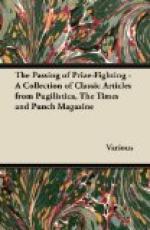About a week after this, the usual crash came. A relative of Johnnie was in difficulties. Johnnie, with his wonted chivalry, came to his help with the few thousands that he had lately put by, and, in a day or two, he was on his beam-ends once more. And so the story went on. Money slipped through his fingers like water—prosperity tweaked him by the nose, and fled from him, whilst friends, not a whit more deserving, amassed fortunes, and became sleek. But he was never daunted. With inexhaustible courage and resource, he set to work again to rebuild his shattered edifice, confident that luck would, some day, stay with him for good. But it never did. At last he threw in his lot with a band of adventurers, who proposed to plant the British flag in some hitherto unexplored regions of South or Central Africa. I dined with Johnnie the evening before he left England. He was in the highest spirits. His talk was of rich farms, of immense gold-mines. He was off to make his pile, and would then come home, buy an estate in the country—he had one in his eye—and live a life of sport, surrounded by all the comforts, and by all his friends. And so we parted, never to meet again. He was lost while making his way back to the coast with a small party, and no trace of him has ever since been discovered. But to his friends he has left a memory and an example of invincible courage, and unceasing cheerfulness in the face of misfortune, of constant helpfulness, and unflinching staunchness. Can it be said that such a man was a failure? I don’t think so. I must write again. In the meantime I remain, as usual,
D.R.
* * * * *
Signs of the season.—“Beauty’s Daughters!” These charming young ladies are to be obtained for the small sum of one penny! as for this trifling amount,—unless there is a seasonably extra charge,—you can purchase the Christmas Number of the Penny Illustrated, wherein Mr. Clement Scott “our dear departed” (on tour round the world—“globe-trotting"), leads off with some good verses. Will he be chosen Laureate? He is away; and it is characteristic of a truly great poet to be “absent.” And the Editor, that undefeated story-teller, tells one of his best stories in his best style, and gives us a delightful picture of Miss Elsie Norman. “Alas! she is another’s! she never can be mine!” as she is Somebody Elsie’s. Success to your Beauties, Mr. LATEY, or more correctly, Mr. Early-and-LATEY, as you bring out your Christmas Number a good six weeks before Christmas Day.




